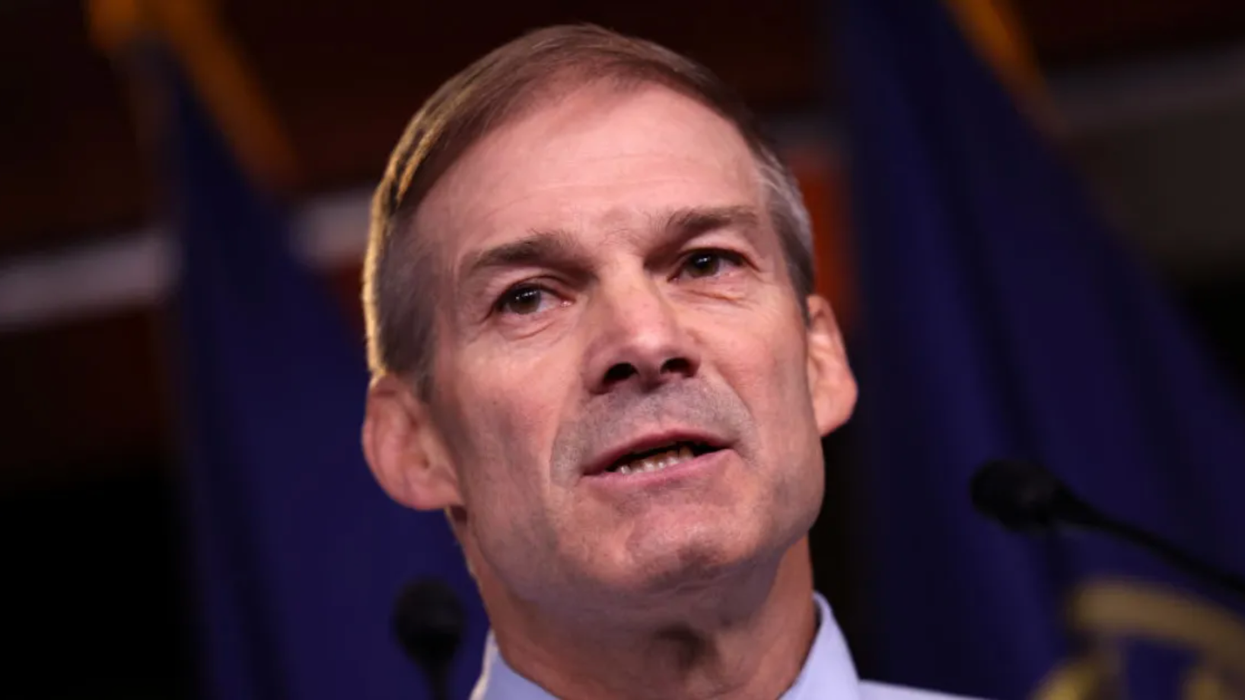Representative Jim Jordan, an Ohio Republican, angered many Americans feeling the crunch of high gas prices after he, in a dig at President Joe Biden, asked his followers if they remembered "how cheap gas was" when former President Donald Trump was in office.
Jordan's claim is incorrect.
In recent weeks, Trump and prominent Republicans have blamed President Biden for spiking gas prices, an issue that continues to be touched upon in daily press briefings. The implication, of course, is that gas prices remained low during the Trump administration but that is not necessarily true.
In recent months, for example, Trump has repeatedly exaggerated the size of the price increase, telling stories on Fox News in which the price of gas when he left office is off by "more than 50 cents per gallon," according to one fact check.
According to price data collected by the federal Energy Information Administration, the national average price of a gallon of gasoline for the week of Jan. 18, 2021, the week Trump left office, was $2.38, which is 28 percent higher than Trump has previously claimed.
Jordan was swiftly criticized, with many taking him to task for his support for Trump, including throughout the COVID-19 pandemic and his failed efforts to litigate an election he continues to falsely assert he won.
This isn't the first time Jordan has sparked controversy for historical revisionism in regard to the Trumpist economy.
Last year, Jordan received heavy criticism after he claimed that groceries "weren't expensive during the Trump administration" at a time when news outlets were reporting that many Americans were feeling the impacts of inflation at the grocery store.
However, rising grocery prices are not necessarily new and were, in fact observed during former President Donald Trump's time in office.
Trump generated significant controversy in 2018 after he initiated a trade war, raising taxes on aluminum and steel. Ultimately, the agriculture industry and farmers in particular ended up paying the price when countries leveled retaliatory tariffs.
In 2018, at the height of the trade war, CNBC interviewed Matt Gold, a former deputy assistant U.S. Trade Representative for North America under former President Barack Obama, who said that:
"With Chinese retaliatory tariffs, we've imposed those on $34 billion of different goods coming from China. It's a very broad array of consumer products, industrial products."
"So everything from the person who walks into Walmart is going to pay higher prices as well as the manufacturer buying material imports for their manufacturing processes."
Indeed, the ripple effects of these tariffs have been felt across numerous sections of the food industry, including beef, beer, cheese, pork, soybeans, and even whiskey and bourbon.








 Roberto Schmidt/AFP via Getty Images
Roberto Schmidt/AFP via Getty Images





 u/pizzaratsfriend/Reddit
u/pizzaratsfriend/Reddit u/Flat_Valuable650/Reddit
u/Flat_Valuable650/Reddit u/ReadyCauliflower8/Reddit
u/ReadyCauliflower8/Reddit u/RealBettyWhite69/Reddit
u/RealBettyWhite69/Reddit u/invisibleshadowalker/Reddit
u/invisibleshadowalker/Reddit u/Wishnik6502/Reddit
u/Wishnik6502/Reddit u/kateastrophic/Reddit
u/kateastrophic/Reddit u/blking/Reddit
u/blking/Reddit u/SlagQueen/Reddit
u/SlagQueen/Reddit u/geezeslice333/Reddit
u/geezeslice333/Reddit u/meertaoxo/Reddit
u/meertaoxo/Reddit u/crystal_clear24/Reddit
u/crystal_clear24/Reddit u/stinkpot_jamjar/Reddit
u/stinkpot_jamjar/Reddit
 u/Bulgingpants/Reddit
u/Bulgingpants/Reddit
 @hackedliving/TikTok
@hackedliving/TikTok @hackedliving/TikTok
@hackedliving/TikTok @hackedliving/TikTok
@hackedliving/TikTok @hackedliving/TikTok
@hackedliving/TikTok @hackedliving/TikTok
@hackedliving/TikTok @hackedliving/TikTok
@hackedliving/TikTok @hackedliving/TikTok
@hackedliving/TikTok @hackedliving/TikTok
@hackedliving/TikTok @hackedliving/TikTok
@hackedliving/TikTok @hackedliving/TikTok
@hackedliving/TikTok
 @vanderjames/Instagram
@vanderjames/Instagram @vanderjames/Instagram
@vanderjames/Instagram @vanderjames/Instagram
@vanderjames/Instagram @vanderjames/Instagram
@vanderjames/Instagram @vanderjames/Instagram
@vanderjames/Instagram @vanderjames/Instagram
@vanderjames/Instagram @vanderjames/Instagram
@vanderjames/Instagram @vanderjames/Instagram
@vanderjames/Instagram @vanderjames/Instagram
@vanderjames/Instagram @vanderjames/Instagram
@vanderjames/Instagram